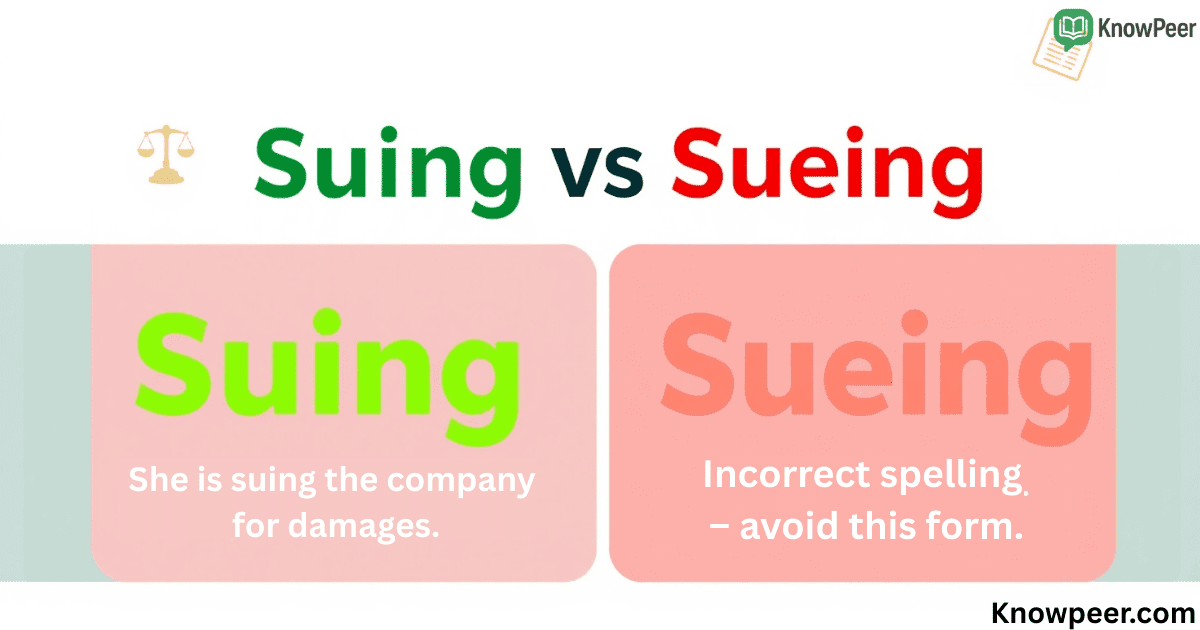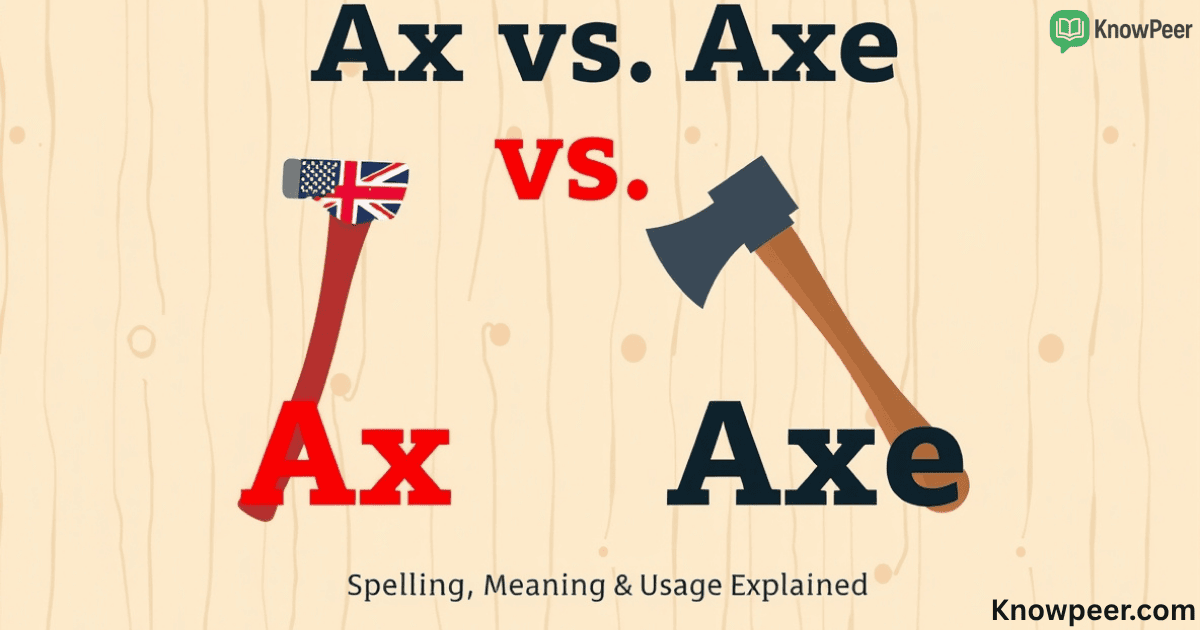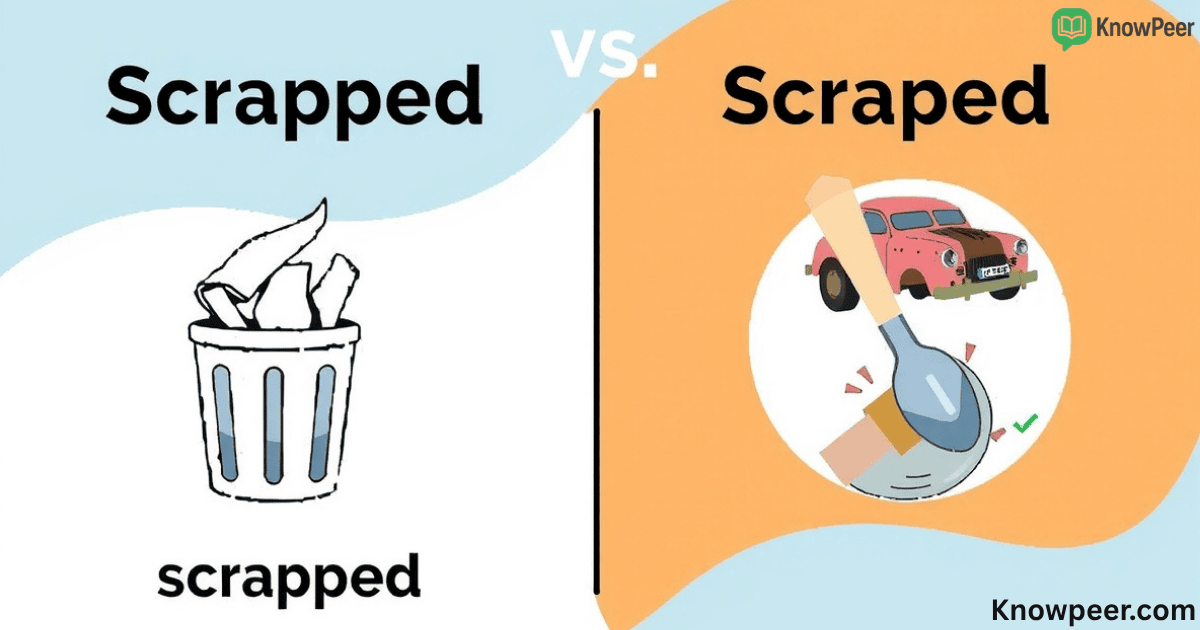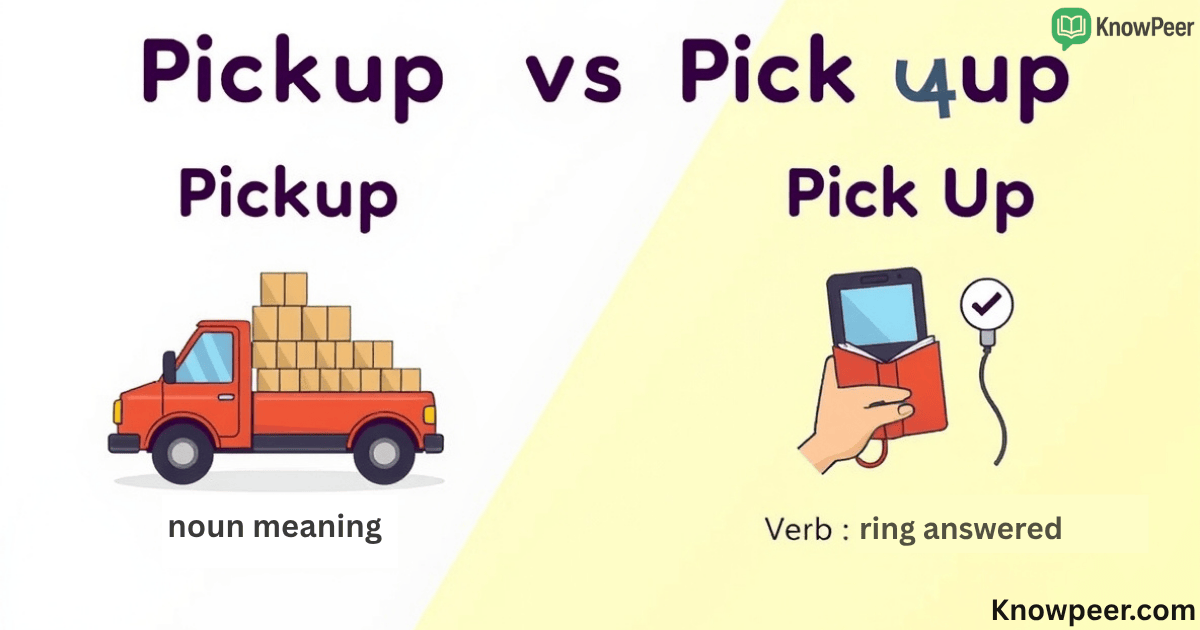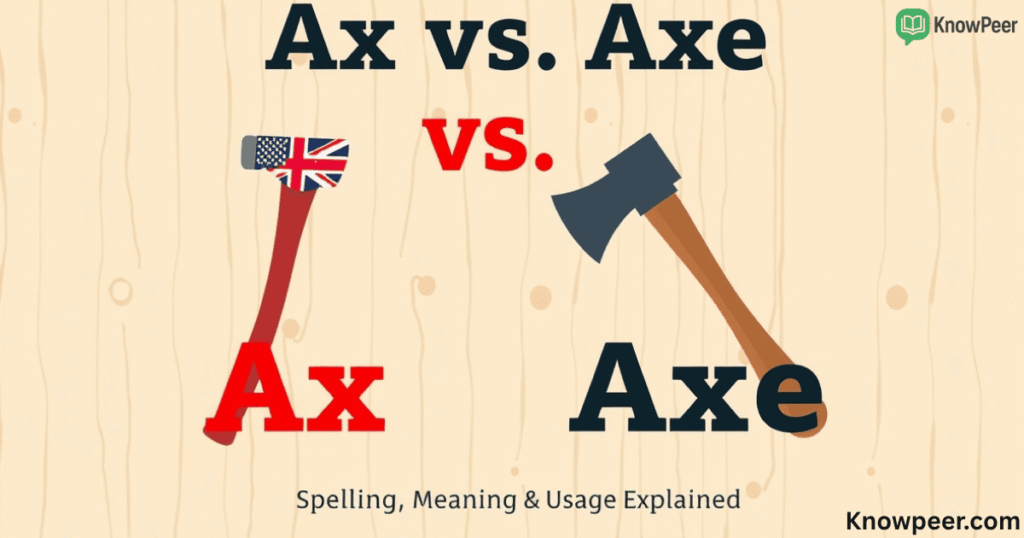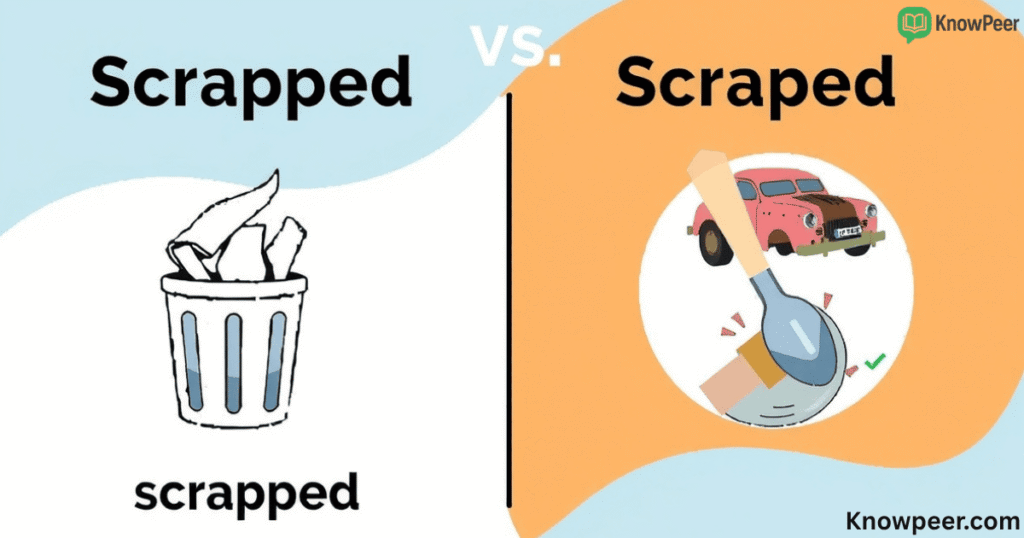When people search for the right way to write a word, small differences can cause big confusion. The words sueing and suing are one of those common mix-ups that trip many people. At first glance, the extra e in sueing might feel natural, but when you look closely at the English spelling rules suing follows, the truth is clear. Only suing is correct, and the version with an e is a mistake. This matters because spelling is not just about grammar. In law and professional writing, accuracy is linked to credibility. A misplaced letter can make a serious paper look careless, and in legal settings that’s something you can’t afford.
The idea of suing might feel complicated, but the suing meaning is simple. It comes from the verb sue, which means to bring a legal claim against someone in a court of law. People use it when they talk about filing lawsuits, demanding justice, or pressing legal rights. Understanding suing vs sueing is more than just a spelling question. It shows how important precision is in both language and law. Once you understand the suing grammar rule, you’ll never doubt the correct spelling of suing again.
What Does Suing Mean?
The suing definition is tied directly to law. To sue someone means to bring a case against them in court. So, suing in court is the process of starting and pursuing that legal claim. For example, if a tenant has been unfairly evicted, they may be suing their landlord to recover damages. This legal action gives citizens a way to protect their rights through the court system. Lawyers, judges, and everyday people use the term in professional and casual conversation, making it a powerful legal term.
In simple English, suing meaning in law is about accountability. If you’re harmed, financially or physically, you can go to court and file a lawsuit. That act of filing and continuing the case is suing. A useful comparison is suing vs filing a lawsuit. They mean almost the same thing, but suing emphasizes the action, while lawsuit refers to the document and case itself. Both terms connect, but only suing describes the ongoing legal act. This distinction matters when you want precision in language.
Why Sueing Is Incorrect
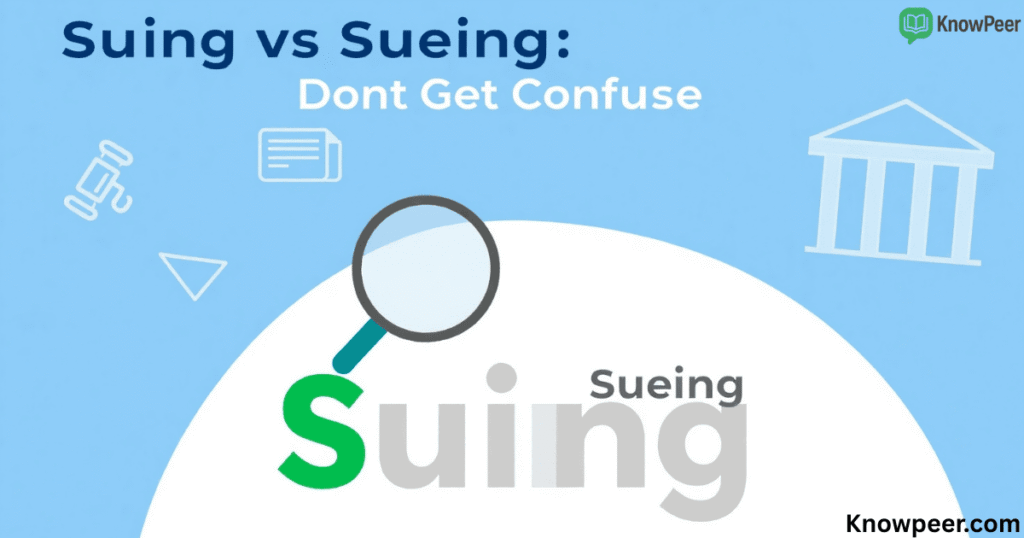
People often ask: is sueing a word? The short answer is no. Why is suing not sueing? Because English spelling rules don’t allow it. The base word sue ends in a silent e. According to the suing spelling rule explained, when a word ends with a silent e, you drop the e before adding -ing. That’s why the correct spelling of suing has no extra e in the middle.
| Word Base | Correct Form (-ing) | Wrong Form |
| Sue | Suing | Sueing |
| Argue | Arguing | Argueing |
| Value | Valuing | Valueing |
This table shows how the pattern works across different verbs. Just like arguing changes to arguing, sue changes to suing. Adding the extra e is a natural guess, but it breaks the rule. That’s why sueing misspelling shows up often in search engines but never in dictionaries.
Common Misspellings in English
The common misspelling sueing examples show how tricky English can be. Words like argue, value, and rescue also lose their final e when we add -ing. Many learners think leaving the e looks right, but that’s a mistake. Just like you wouldn’t write argueing, you shouldn’t write sueing.
Mistakes like this are common because of how English spelling rules work. Silent letters confuse people, especially when they are learning quickly. This is why English spelling rules suing matter so much. The more you see the correct form, the easier it becomes to remember. Writers, students, and professionals should double-check spelling to avoid small but costly errors. Even online, when people type suing vs sueing, they are really asking how to spell suing the right way.
Grammar Rules Behind Suing
The suing grammar and spelling rules are clear. If a verb ends with a silent e, drop the e before adding -ing. That’s why sue becomes suing. This is part of a larger spelling pattern in English. Words like drive → driving, and make → making follow the same pattern. There’s no need to keep the e when the -ing already provides the right sound.
Some learners look for exceptions, but suing grammar rule doesn’t have any hidden surprises. You can think of it this way: if the e is silent, let it go. This simple memory trick makes it easy to avoid the sueing misspelling. Spelling rules like this keep English consistent, and once you know them, you’ll always use the correct use of suing in legal writing.
Everyday Usage and Synonyms
The term suing isn’t limited to lawyers in courtrooms. You’ll find it in news headlines, personal stories, and conversations. For example, “The company is suing its competitor for breaking a contract.” These suing examples show the word in action, both formal and casual.
If you want to use a different word, there are several suing synonyms. Some include litigation, pressing charges, filing a lawsuit, legal action, and taking to court. Each of these carries a slightly different tone, but all of them express the same general idea. A quick chart shows the relationship:
| Synonym | Example Sentence |
| Filing a lawsuit | She is filing a lawsuit against her neighbor. |
| Litigation | The company entered litigation after the dispute. |
| Pressing charges | He is pressing charges for theft. |
| Legal action | They took legal action over safety violations. |
| Taking to court | The singer is taking the agency to court. |
Impact of Incorrect Usage
Language carries weight. If someone writes sue vs suing wrong in an email, it may not matter much. But in law, where terms like suing legal term appear in official documents, spelling mistakes can be costly. Using sueing misspelling in legal paperwork could make the writer look careless, and that damages credibility. Judges, lawyers, and juries take accuracy seriously, so the correct spelling of suing matters beyond grammar.
Even outside of court, the impression you create with words is powerful. A resume, a business proposal, or even a blog post with repeated mistakes weakens the message. The impact of incorrect usage is real. That’s why people search for how to spell suing. They want to be confident in both casual and professional writing.
Case Study: Real-Life Usage of Suing
Let’s look at a case study to see the difference in real life. In 2019, Tesla was sued by Walmart over rooftop solar panel fires. The news reported: “Walmart is suing Tesla for breach of contract.” Here the spelling is clear, professional, and correct. Imagine how odd it would look if a respected outlet wrote sueing Tesla instead. The mistake would damage credibility and trust.
This case proves that the correct use of suing in legal writing is not just about rules. It is about being taken seriously. Public figures, corporations, and government agencies all rely on consistent language. Even small slip-ups can lead to public criticism. That is why when you see suing vs sueing, you’ll know one is professional, while the other is an error.
Other Related Legal Terms
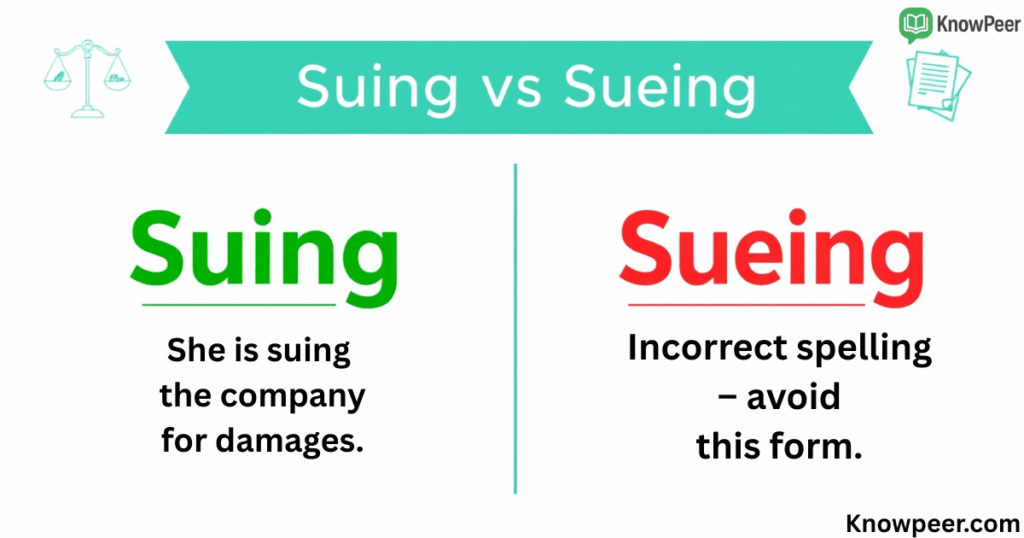
The word suing connects with a family of legal terms. Words like lawsuit, plaintiff, defendant, attorney, litigation, and settlement often appear together. For example, when a plaintiff is suing a defendant, the process is called litigation. If both sides agree before trial, the result may be a settlement. This shows how the act of suing fits within the wider legal vocabulary.
Understanding suing legal term connections helps people see the full picture. Language shapes how we think about law. By learning terms around suing, you improve both legal literacy and communication skills. This also prevents confusion when reading documents or hearing news about lawsuits.
Frequently Asked Questions (FAQ)
Readers often ask what is the difference between suing and sueing. The answer is simple: suing is correct, and sueing is not a word. Others ask, why is suing spelled without an e? The reason lies in the spelling rule that drops the silent e before adding -ing.
Another common question is, how to use suing in a sentence. Examples include: “She is suing for medical malpractice” or “The company is suing its supplier for late deliveries.” People also wonder, is sueing a word. No dictionary lists it, and it is always marked as a misspelling. Finally, readers ask about suing vs taking legal action. While both mean seeking justice in court, suing is the specific act of bringing a claim, while legal action can be broader.
Conclusion
In the end, the debate of suing vs sueing has only one answer. Suing is correct, while sueing is simply a common misspelling. The suing grammar rule is clear: drop the silent e before adding -ing. Using the correct spelling of suing shows credibility, professionalism, and care, whether in court documents or casual writing. The next time you see the question why suing not sueing, you’ll know the answer. The rules are simple, the usage is proven, and the meaning is clear. In both everyday language and serious legal writing, the choice is always suing.

